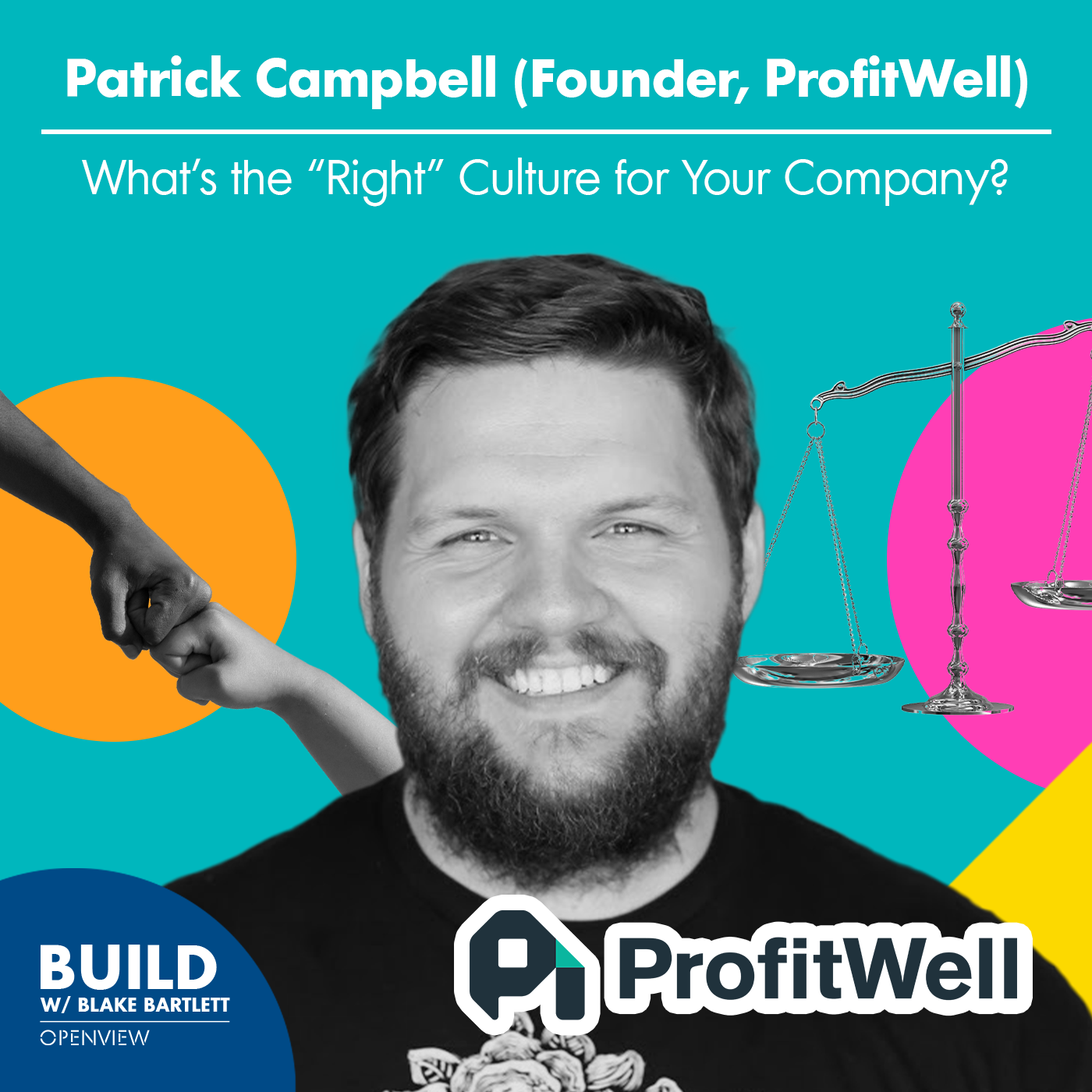Astha Malik (Zendesk & VTEX): Product Marketing 101
- 0.5
- 1
- 1.25
- 1.5
- 1.75
- 2
Blake Bartlett: Welcome back to The Build Podcast. I'm Blake Bartlett, a partner at OpenView. We're here to help software founders and operators identify and unpack sustainable growth strategies. And the ever- changing world of SaaS. Today, we hear from Astha Malik, Zendesk's VP of go- to- market strategy. When it comes to product marketing, Astha has an unrivaled background, having led product marketing at Zendesk, Sumo Logic, PagerDuty, and more. In today's episode, we unpack the role and impact of product marketing at all stages of company development, and how to think about building a product marketing team, including pro tips on finding the right leader for your company, all of that and more on this episode of Build. So let's dive in with Astha Malik. We'll Astha, thank you so much for joining us here on The Build Podcast. It's great to have you on the show.
Astha Malik: Yeah. It's a pleasure to be here.
Blake Bartlett: Now the goal for today is to talk all about product marketing, an area that you know, very, very well, probably better than most. And I think as a first starting point, it'd be really helpful just to jump into the background of product marketing, at least for my sake. So maybe first off, just for my benefit. What is the purpose and impact of product marketing from your view?
Astha Malik: I might be a little biased here, but I think ultimately the goal of product marketing is to feel revenue growth. I'm not saying that, that's the case in every organization, but it should be and it could be, right? Product marketing can be a very high impact role in all sizes of organizations. And I think, again, if you just break down the two words, product and marketing, right? The product marketing folks need to be an expert in both the product and the markets, and hence I think should play a much bigger role or a part in defining the go- to- market strategy and the motions for the organization. And again, I think there should be thought about as a partnership between product marketing, product and the sales teams and an effort to, again, as companies are growing or scaling, no matter what stage that they are, as a re- engineering the product, right? The product marketing teams can help them with that. And ultimately re- engineering the conversations alongside.
Blake Bartlett: And what do you think are the biggest misconceptions about product marketing?
Astha Malik: I think product marketing, if you look at the various disciplines of marketing, it might be considered maybe relatively newer discipline. When I say new, of course, it's not born yesterday but at the same time it's not as old as markup, right? So there are definitely some misconceptions and the role itself and the scope of product marketing can be on a wide range of spectrum, right? So it can be from content creation to order takers for launches to actually catalyst in driving strategy and fueling the growth for the organization. So I think again, most organizations are hungry for a partnership where PMMS can step in and represent the voice of the customer, the market trends, and ultimately help efforts ranging from finding maybe even product market fit. If you're earlier in your stage as a company to establishing ownable territory, scaling the business, identifying adjacent markets, category creation, and so much more. So I think it's so much more than just running point on product launches, unfortunately a lot of organizations still tend to do that.
Blake Bartlett: I'm so glad that you point to that because I know working with founders and working with startups, one of their challenges that I experienced with product marketing is, you need to have the first question be," What do you mean by product marketing?" Because there are so many different definitions and perceptions of what the practice and discipline is, and so getting on the same page and making sure that your definition is the same as my definition, is incredibly important.
Astha Malik: Yep. A hundred percent agree.
Blake Bartlett: So how do you measure success for a product marketing team or org?
Astha Malik: Yeah, I think that's a hard thing to do, to be honest, right? So measuring success, proving the ROI of the efforts for product marketing's always been hard. So my approach has been to align your goals with the goals of the stakeholders that you're serving, right? So for example, you're working very closely with the product team, right? And again, defining the market strategy. So why don't we actually sign up for the product adoption goals, right? So if you're going to be point person for the market strategy and the product launch, then you should sign up for those goals. And I think that is a great way of creating that partnership and the validation and credibility within the organization. I also think that product marketing ultimately is setting the foundation for the marketing strategy. So even if you're not the ones who are running all the campaigns, but you're helping establish, again the target markets, the messaging, the differentiation, then shouldn't you also be owning the outcome of the campaigns? So, as you're working with your marketing teams again, identifying how to then target these customers or prospects, then I think you should have a part or a goal associated with success of those campaigns and outcomes there. And then last but not least also from a sales perspective, again, you're not on the floor actually selling the product, but maybe this is more in the form of enablement and productivity. And ultimately if you wouldn't have say a specific product assigned to you and you're running on point as the product marketing lead on that product, then the success of the product in the form of the sales goals and achievement, et cetera, should be tracked as a part of your OKR. So again, I think ultimately having a measurable outcome like that, gives a clear purpose to the team. I found it that it actually motivates the team. It aligns you closer to the overall business goals and this just creates better credibility and ROI for the marketing work.
Blake Bartlett: Well, then in that idea of goal alignment is also a great answer to the challenge that we just talked about before, which is, what is the definition of product marketing in your view and this idea of goal alignment, I think about it as jobs to be done. What is the job that needs to be done by product marketing, which we defined by a specific goal of the stakeholder. And that helps to create that alignment and get ahead of that misperception issue that might happen in product marketing. So I really like that as a way to cut through.
Astha Malik: Yeah, I agree.
Blake Bartlett: So unpacking product marketing and what this might look like in real life for folks listening to this podcast right now, I thought a good way to break it down would be to think through what do you need from product marketing at different stages of a company development, early, mid stage, late stage. And so maybe if we start with the early stage to begin with when a company is maybe zero to$ 10 million of ARR. When should a startup in that position hire their first product marketing person?
Astha Malik: Yeah. I just have to say, this is a really interesting question, and if you ask someone who leans more towards demand marketing or growth marketing, you'll get a completely different answer. But my perspective is that, when you're at an early stage and you mentioned, let's just say it's between zero to 10 million, right? That's your definition for the purpose of this conversation. I know at that stage most companies are still trying to establish their product market fit, right? So I believe that as soon as you hire your demand gen person, I would argue you need to hire a PMM alongside, right? And I realized that again, at this stage you don't really have all the resources you can't hire multiple VPs, totally understand that. But I think you are probably also still working with the first few customers and there is this huge opportunity to learn on what's working, what's not working. That it really helps shape the product strategy, the market strategy and ultimately your campaign strategy from there, right? So I think from that perspective just making sure that you have a product marketing person and maybe they lean a little bit more towards research and content creation. So, someone who could come in and just stay in touch with the customer, the changing marketing or market trends and then also instead of your demand gen team, relying on maybe the stale playbook from another company, you can actually use data to inform decisions and meaningful decisions and guide the whatever limited investment you have available for marketing. So I just think that ultimately it'll help you direct the limited dollars and limited resources in a more meaningful way. And it's just more efficient for our organization. So, I'm also thinking at this stage, you have a very small sales team. So it's also important to have consistency and the messages that are going out to the market from your company, right? So if there's a product marketing person, they can make sure that everything that's going out from the demand gen funnel through sales enablement, your brand identity is not getting diluted in these formative years and the messages that sales and marketing are delivering to your customers are consistent, and I think product marketing can really help establish that.
Blake Bartlett: And super specific up question just to make sure I'm clear on it, and our audiences as well in your view. So what's the relationship between product market fit and hiring a product marketing person? Can you do it before you have product market fit? Will that help you establish and find product market fit faster? Or is it really best to wait until you have that product market fit?
Astha Malik: I think it really... it depends and it can be done both ways and other recommendation, keeping that in mind is that at this stage it might even make sense to have the product marketing person report into the product organization, right? Because the product teams are also in their formative years, they're learning about the customers, how to actually shape that strategy. And they're not thinking 10 years at this point, right? They're thinking, what are people responding to? What are people reacting to? So there's ambiguity, there's agility that's needed. So from that perspective, I think you can actually bring in a product marketing person who can be part of the product org and can help shape that product market fit, even if it doesn't exist today.
Blake Bartlett: Okay. Perfect. Makes a lot of sense to me, and so when you know that it's time to hire this first product marketing person, and you're moving to actually writing that JD and writing this back and starting to look for candidates, what should you look for in that first product marketing hire?
Astha Malik: Yeah, I think I'll mention this briefly. It's going to be really hard for you. Again, limited resources, limited reach the company at this stage to get someone who's just a pro in all aspects of product marketing. So again, to get the most value and the most meaningful outcomes early on, I would say, get somebody who's been in a role where they've been in touch with customers, right? You need somebody who can bring that voice of the customer back to the table in front of the product leaders, in front of the marketing leaders. So somebody with that aptitude and I've also seen many a times folks wear multiple hats in a smaller organization. This could be someone who's done a success type role in the past. And is trying to... and just articulate again, what they're seeing in the market and bringing it back to the table. But then you have to also have... or pair that with some ability to create messaging and content that your teams can ultimately start using again, the scale is small. So you might be able to find someone with that mix of the ability to reach out to customers, learn from them and then translate that into messaging that your teams can use and relay back to the customer.
Blake Bartlett: Okay, perfect. And so the next step is the person's in seat. You've made your first hire. What does the first 100 days look like for your first product marketing hire? And what the first year look like? I guess that gets a little bit more into what you talked about before of the definition of success, but what does it look like in these first critical days of product marketing?
Astha Malik: Yeah, I think going back to, again, the profile that we talked about, if this person is able to create some sort of a market scope document, right? That just talks about the emerging market trends is able to do the market mapping in terms of the various areas or various markets and positions the company could take, and what that landscape looks like, maybe even from a competitive perspective and really form meaningful set ups in a data and information that presents choices back to the product team and sales teams. I think that would be a big goal in my opinion in the first day, even like 90 days. The other thing that is a continuation of that or an extension of that is then, how do you then create once you've established at least your first sub market that you want to start creating a position, and then how do you establish the ideal customer profile in that? So I think those seem things that of course you need to do, but if you prioritize that, I think that's where you can drive a lot of focus in the org, because in a startup that can be a hard thing to do, right? You're just, again, listening to the market, you'll hear a hundred things. How do you narrow down and start somewhere, get success, and then expand into the lookalike categories. So to me, if the product marketing person is able to do that market mapping exercise and create that ICP, I think that would be a great win again in making sure that the marketing teams overall and the sales team know where to focus and they're not wasting their time on things, which ultimately will not be something that the company would pursue longterm.
Blake Bartlett: That's a perfect summary to me of what do you need to think about in this earlier stage of a company's development as it pertains to product marketing. And then I guess if we move to the next phase, I'll call it the mid stage from the early stage and a company that's arguably between 10 and a hundred million dollars of ARR and growing through that phase. When do they know that it's time to hire a VP of product marketing and build a proper department around the function?
Astha Malik: Yeah, I think first of all, 10 to a hundred is a long journey, right? A lot of things change. I think if you look at that range a$ 10 million company looks very different from the one that's approaching a hundred. So let's just assume for this conversation, because we've already talked about the early stage that this is more about the company has established the product market fit, right? You have enough validation and now you're thinking about," Well, how do we continue to feel the growth? What does the future really look like for the company? And what are the right investments to be made." So this is also a really, really easy, or just that prime time for companies to get distracted. Because if you think about you've got the product market fit, you've got your first few set of customers that are paying enough money. And, you've got the confidence of this company is off the ground. And now it's just about scaling and execution and your first few customers can be your hardest customers, right? Because they will almost take advantage of the fact that you're new. You are going to be listening to them a lot more than any other established company out there in terms of what they need. And they can not just influence you, but almost force you sometimes to share the strategy, your product strategy, especially. And I think that's where product marketing can play a very, very important role, right? Instead of providing distractions with maybe a couple of use cases or product needs or features, requests or anything that you're hearing from the customer that can deviate from, again the long- term focus of the company, they can again, help reestablish that focus. So I think companies at this stage like I said, have a tendency to say, yes, because they're like," Well, we are afraid to lose our first few customers, we can't do that." But I think if you build a solid PMM team at this point in time with a seat at the table, they can continue to reinforce the mission, articulate the choices that we as a company have in front of us and what does it mean in terms of... and quantifying those opportunities and the opportunity costs, right? So, you know, what still makes sense. What is still relevant for the company, where to say yes and where to say no. So I think product marketing can have a very influential role, but again for that, you need that discipline at the table and listening to... again, what are the long- term objectives of the company instead of getting distracted by maybe one or two asks. And frankly at times B maybe the person who actually helps the company say no to a couple of choices and decisions, even if they have a high dollar attached to them because that just causes maybe short- term efficiencies, but the long- term inefficiencies. So that is the role that I think product marketing can definitely play.
Blake Bartlett: That's really powerful back up to one of the first questions I asked you, which is what is the role or the purpose and the impact of product marketing? I hadn't thought about the impact of product marketing being around avoiding distraction and being the remedy to a startup's tendency to say yes to everything. So that's a really, really interesting clarifying role for product marketing at this stage, that's great. And if you're looking to build out that proper department and bring in the VP of the department, what should you look for in a VP of product marketing?
Astha Malik: Yeah, I think at this point you probably want to invest in somebody who's done this before, right? So invest in someone and you've got choices you always will have choices, and I can't speak to all kinds of scenarios but essentially you can go down the path but one, getting in somebody for maybe a larger company who's actually seen that kind of scale. Who's been a part of, again, that journey where they were influential in helping make the decisions. And like I said, inaudible who's going to be the person who helps says no to the choices of the company is going to make. And, or you can get someone who's again, played a broader role and maybe another startup and I think sometimes we get too hung up on domain experience, right? And I might have a different view again here than others, but one of the things that I've heard time and again, as people interview, and even when my team is interviewing, they're like," Oh, this person didn't really have direct industry experience or domain experience." And I'm like," Well, that doesn't matter." I think you can teach those things unless you have a very specialized and highly technical product. To me, what matters is," Do they have deep experience in product marketing?" Period, right? Of course, somewhat relevant to what you're doing, but not exactly maybe in the same category or the same space that you have. But I think you almost have to anyway, right? Unlearn a lot of things. If you're a good product market, you're coming in with the assumption that, my previous playbooks are probably not going to work here. What's going to work is if I'm able to get a deep understanding of the market and the customers. So to me getting those things in order and then finding that person is what I do.
Blake Bartlett: And what do you think are the biggest things that a product marketing department needs to own and deliver at this mid stage of 10 to a hundred million dollars of ARR? I know there's a lot of things that happen in that very wide range of revenue numbers but generally speaking, what should the department own and what does success look like?
Astha Malik: Yeah. I think again, depending on again, who your customers are, which industries you're targeting. The approaches might be different, but let's not underestimate the role of product marketing in helping the demand and the growth marketing teams really refine their strategy. I think at this point in time, in addition to the conversation we had around having a seat at the table and really helping reinforce the focus and presenting choices and it shouldn't come as like," Oh, I think we should do this." But in then choices in the form of voice of the customer or the market data that help you validate certain decisions that's one, of course. And then on the other hand it is again, important to... as your demand gen machine it's scaling, this person can actually help elevate the conversations because I'm pretty sure zero to 10, you're having conversations around the products and capabilities, right? And they can be very feature centric. They can be very tactical type of conversations. And, now is the time to transition, to tie into certain initiatives that your customers are trying to drive and helping up- level that conversations through channels of sales on your website, through demand gen, et cetera, is going to be a big part of the role. And I think that's how you show that the company's maturing, that your product is maturing and that you have a bigger story to tell in the market. So I think your storytelling ability has to evolve from tactical product conversations, to meaningful conversations around the initiatives and the problems that you're trying to solve, the jobs that your customers are trying to do. And, if you're able to then tie them to the ultimate business imperative, right? And every company has four or five imperatives and some of them are common across the board, they can be cost- saving, they can be efficiency agility, whatever those are and customer experience, of course, then if you're able to tie to those bigger imperatives that's a bonus, right? So I think this is the formative stage of transitioning from tactical conversations to more strategic conversations with your customers.
Blake Bartlett: So back to our startup journey from early stage to mid stage, we just closed that one out, brings us to late stage, which we'll call, hundred million dollars of ARR and beyond. And so let's say a company in this stage is planning to go public in the coming months. What are the most important product marketing priorities for a company at that stage?
Astha Malik: It's like almost you're coming out of a shell, right? Is private company, of course your customers know you, and there's a decent understanding in the community that you operate, but going public is like you're suddenly getting exposed in the public markets and there's going to be more questions. There's going to be more scrutiny. You have to almost again, revalidate your position as a lasting company, right? As an enduring company and for that, one of the first things that comes to mind is," What category do you really play in, right? Is that a sustainable category or not?" And having been through some of those transitions in journeys before even a PagerDuty, right? We have to rethink where do we play? Which category do we actually associate ourselves with? And there wasn't really a perfect fit, right? And we didn't want to force a fit. So we thought we should actually create our own category and we did, we created Digital Operations Management and we had a bigger and a broader story to tell around that. But it's a hard thing to do, you really have to know if you're going to be in the business of category creation or you're going to be in the business of like," Okay, there's an existing category. And we just have to drive differentiation."
Blake Bartlett: This is a hot topic with a lot of founders that I spend time with, which is category creation. And so we can do a little mini deep dive into category creation. So you're alluded to it a little bit with your PagerDuty experience, but how do you know if it's time for you to create a new category and really flex that category creation muscle versus focusing on differentiation within an existing category, how do you make that determination?
Astha Malik: I think there are a lot of leading indicators for that, one is you as you talk to customers, if your customers are constantly confused, so are you this kind of a technology? Or are you that kind of a technology? That means they're not able to specifically pin you down in a certain category, right? So that's very telling because of course there are the ultimate users and they have probably existing products in their technology stack. So they're like," I don't know where to place you. Are you this, are you that?" Even with PagerDuty, it was like we operated in a very complex technical stack that was evolving. So people were like," Are you an APM solution? Or are you a log management solution?" Then you send out alerts or what do you really do? So it was very clear that we weren't really a perfect fit into one of the existing categories and so that was one of the telling reasons if you will. The other is... I'm sure at this stage, especially if you're planning to go public and you're trying to establish your position in the market. You started talking to the analyst community and the analyst community is asking you similar questions, right? They have their own market scopes, they have their own quadrants and all these reports that they do. So they're like," Well, where would I put you?" And if they are confused and they're trying to force you to in a certain category that you don't agree with, I think that's another sign. So those things combined that can be very telling. But I think to your point before then, when do you know," Okay, well I don't think I fit into any of these categories. It's time for us to create one." Just because of that, you just can't go ahead and create one category, right? Because there are some additional qualifiers and that you have to consider, right? What you're doing, is it really different enough? Right. Is nobody really doing something like that, that you think this requires or mandates a new type of category? Is the market that you want to operate in big enough? Right. And that's an important one because I think it's also about building that sustainable business. So it's not tied to maybe a specific event, for example, some... a lot of companies or a lot of products came about last year due to the pandemic. And, of course it's an event that hadn't... again, impact on a lot of people, a lot of companies, but we know that this is not going to be a lasting event. So make sure as you think about category creation, you're tying yourself to something that is sustainable. And then, as you compare yourselves with, maybe they're not your competitors, maybe they are just your partners that ultimately there's some cooperation between the companies, and look at those Venn diagrams, right? And then think about what is the common space. If there's a lot of commonality then probably not ready for category creation, but what do you do versus what others do? If the Venn diagram has very little overlap, then that's a good validation for you to think about again, it's the right time to create a category.
Blake Bartlett: And so if you go down the path of deciding to create a category, the next step is, well, what is the category? And so I guess my question there is how important is the specific name of the category that you come up with and how do you define it?
Astha Malik: Yeah. Yeah. I think those things are really hard, but very important and words matter, especially if you're thinking about creating a new category, you have to keep it simple. You cannot have fancy words or jargon like be the definition for the new category that you're creating. And I think if you do that, then people will actually get even more confused than they were prior to you stepping into this new category. So you have to keep in mind, if I tell somebody about this for the most part, can they understand what are we trying to do? Right, or what the solution is all about. And then second, obviously is product marketeers or even if you have brand folks and you're using an agency, for example, for brainstorming the name and all the great stuff there, I'm sure in house you'll come up with great ideas, but ultimately it has to stick, right? So going back to the point around simplicity, that is one way to just make sure that you're on the right track. The other is, before you think tank session internally, I would again say, reach out to the customers, look into the data. What does the data tell you on where your customers are using and how your customers are using your technology? Talk to the analyst community. You will need their help in establishing that category, right? So you want them to be partners along the way, float ideas with them, get their feedback and get their take. They might give you some really meaningful insights there too. And then, just also talk to your customers, your existing customers know you the best. So you got to talk to them, share your early thinking and ideas with them. And then ultimately your category creation is lining up to the vision for the company. So it's not just about what you do today, but where are you going tomorrow? So just getting that feedback from your existing customers is going to be super meaningful. And then last but not least, just on the same thought around your vision and ultimately what do you want to become as a company? You have to make sure that you're attaching yourself to something bigger, your category cannot be attached to something very small. So, if I looked at what PagerDuty was doing in its early days, it was an alerting tool. We couldn't call ourselves an alerting tool, right? That's not a category. It's not meaningful, it's not sexy. It doesn't resonate that it's something that will ultimately transfer into a public company or a lasting company. So we started looking at, what is the bigger story out there? What is really happening in the market as businesses are becoming digital, right? And there is this huge wave that is sweeping all industries, it's forcing everyone to think differently. The most traditional businesses are being forced to go digital. So, what is our role there? And our role it's in a more about aggregating all the insights, streams of data, tied to their critical services as companies were getting ready to become digital companies, and it was becoming very critical for them to make sure that their operations environment was running all the time, right? So just being that kind of a business that's always on. And as we started thinking about those things, we were like, okay, well, businesses are becoming digital. They're operations are becoming digital. They're becoming very complex and they need someone or something or a technology to actually monitor that and manage that in a way where it's not resulting in poor customer experience, which ultimately results in dollars lost, right? Because customers have choices. If you're not giving them the experience they want from you, they have enough choices, just another app on their phone or another website on their device. And they can go ahead and they can just pick somebody else. So this whole thinking and brainstorming around this bigger idea helped us frame that maybe we should call our category Digital Operations Management, right? That's what ultimately we are doing for our customers. And it resonated really well with our customers. It resonated really well with our analyst team and the company has been using it since. So that's the story there.
Blake Bartlett: And last question for us on this company journey. So we're in the late stage, we're focused on category creation. We've realized that we need to create a category. We've come up with the best possible name for that category that we can. We've tested it with customers and with analysts and great. So what do we do now? Now that we've picked the name of the category, how do we successfully roll out the new category and make it actually stick?
Astha Malik: I think repetition is key, right? And you don't want to be the only ones talking about the category, it almost has to be a chain reaction. If you're able to tell a compelling story around it, your sales teams, your marketing teams, your customers, your community, your analyst, your press relations, everything combined. I think that create the surround sound experience where everyone is saying it, and I think that repetition ultimately creates a validation in the market and that's what happened for PagerDuty as well. So you have to continue to tell the story because, you're operating in an attention economy, everyone's trying to tell their story. So you got to use all your channels to continue to reinforce and tell it in a consistent way, that's important. You don't want your sales team to explain the name of the category or the category itself in a very different way than your marketing team would. So, that's... consistency is important.
Blake Bartlett: That's awesome. But I think that journey gives something for everybody, all the founders, all the operators listening right now, regardless of where they are in their journey in a company's life cycle. There's some good nuggets in there for them to glean on product marketing. So, that's great. I guess my last question for our conversation here is today, is zooming back out to product marketing writ large. How should product marketing think about responding to unexpected changes and disruptions? So COVID-19 is the obvious example. How does product marketing respond to something like that? Is there an opportunity for agile product marketing or is product marketing something that's more fundamentally longterm oriented?
Astha Malik: Well, that's a very good and timely question, I suppose. I think for a strong product marketing teams learn and know how to work in an agile and ever- changing environment, right? So again, things... especially in the startup environment anyway can be sometimes ambiguous and fast- changing. So if you're a good product marketing leader, you understand the concept of impermanence of market trends. So that to me, sort of like a fundamental requirement for a good product marketing person, but sometimes the disruption can be really, really big. So it can be a big market consolidation event, or it can be what happened to all of us last year with COVID. So, I think knee jerk reactions in these extreme situations can be a really bad idea. So no one really had a playbook for COVID. We all had to learn and learn it all together. And I think again, understand the implications of what was happening both from a short- term and long- term perspective. So I think in that situation, what perhaps companies can do or good product marketing people can do is again, go back to first listening to your customer. What does this change really mean for them? And again, if you're building a lasting business, then that should be your first reaction. So, how can you help your customers? Again, how can you provide them or offer them any relief? And then being in touch with them and provide that information back to your product sales and success teams. So they can also reorient their priorities accordingly. So that to me is the first thing that you can do. I think, the other thing as the market and our macro environment overall change, right? So what a good product marketing person can do is that they're not... again, think about how do we pivot, but maybe think how you can reduce your risk exposure, right? And go back to what did you do when you had fewer resources? What did you do when you didn't have many choices? What actually worked for you? So it's almost like going back to maybe even basics. So, knowing that if we do what we did best, right? Over the last few years, and that caters to maybe 80% of the use cases, 80% of our business and customers, that's okay if it reduces your risk exposure. So it's almost in a standardizing your actions based on what you know your strengths are, and then maybe avoiding heavy lifts associated with any high- risk, high- reward situations, whether that's in exploring new markets or edge cases or new strategies for expansion into different areas and territory. So again, putting that on hold till you figure out what is the long- term implication of what's happening around you, especially, like I said, what happened with us with COVID, I think that'll keep your business going. We'll give your teams again, a focus instead of paranoia or confusion or any fad. And then you've slowly can... and start opening up beyond your standardized or back to basics approach. So I think that can be very meaningful in any situation where things have drastically changed overnight.
Blake Bartlett: Well, that's perfect advice about going back to basics, staying focused, going to the customer and the customer will tell you what direction to go in, so that's perfect. And Astha this has been a great conversation about all things product marketing. I know I've learned a lot and I have no doubt that the rest of our listeners have as well. So thank you for joining us here today on The Built Podcast.
Astha Malik: Well, thank you for having me. It's a pleasure.
Blake Bartlett: Thanks for listening to this episode of Build. If you like what you've heard, leave us a review on apple podcasts and subscribe to stay up to date with all the new episodes. Follow me, Blake Bartlett on LinkedIn to join in on the conversation and let me know what you think about the show. Join me this season on Build, as we look into the brilliant minds, scaling slack, notion, LaSeon and more to discover what it takes to build an awesome product and achieve hyper growth across every stage of maturity from seed to IPO and beyond. If you're ready, let's build this together. See you next time here on Build.
DESCRIPTION
It often seems that product marketing is the least understood aspect of marketing. Many people are even confused by the definition of product marketing - what is it, exactly? In this episode, Astha Malik takes these challenges head on and gives us a masterclass on the role and impact of product marketing at all stages of company development. And if you’re hiring for PMM roles, you won’t want to miss her recruiting advice.
Today's Host

Blake Bartlett
Today's Guests







